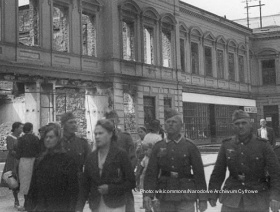
(Photo: wikicommons/Narodowe Archiwum Cyfrowe)
Each week, we share with you a story of heroism and survival during the Holocaust, often focusing on Christian heroes who saved Jewish lives during this dark chapter in history. This week, we’re also sharing the story of one of those who survived. The Jerusalem Post’s Alan Rosenbaum shares the story of an elderly Holocaust survivor in Israel, who tells of chilling trials and tribulations as a child:
Chaya Bressler was born in April 1939, just five months before Nazi Germany invaded Poland. Her parents, Avraham Yosef and Chana, realizing the precarious situation of Polish Jewry, tried to find a non-Jewish family that would agree to take their daughter in.
“My mother tried to find non-Jews willing to take me, but because parents were well known in Nadvorna, no one wanted to risk their life for a Jew,” says Chaya. “No one wanted me.”
Her father was arrested and imprisoned by the Germans in 1939, escaped in 1941, and joined the partisans in the forests.
After two years, Chana was able to contact her husband and informed him of the difficulties she had encountered in finding a family that would agree to take Chaya.
A fellow partisan told Avraham Yosef about Stanislaw and Karolina Klimek, a childless couple living in Debszczyzna, a village near Lublin, who might agree. Together with his partisan friend, Avraham Yosef went to their home, and the Klimeks decided to accept Chaya and raise her as their daughter. Before leaving, Avraham Yosef requested that they agree to return their daughter to any family member who might survive the war. The couple assented.
Stanislaw and Karolina took Chaya to Lublin, where they registered her at the local church under the name of Wandjia Klimek. At the same time, explains Chaya, they added the name “Clara Bressler” to a list that was kept in the church of the Jews in the town who had been killed. “We went back to the village, and life went on,” says Chaya.
Chaya’s earliest memories date from when she would be severely beaten by children in the village, who called her a “Zhid,” which is the Polish word for “Jew.” She didn’t understand the meaning of the word and excelled at the prayers that she had been taught in church. “We went to church every Sunday, and I knew my prayers better than any of the other kids,” she says….



